Or: How fixing wells became my path to understanding…
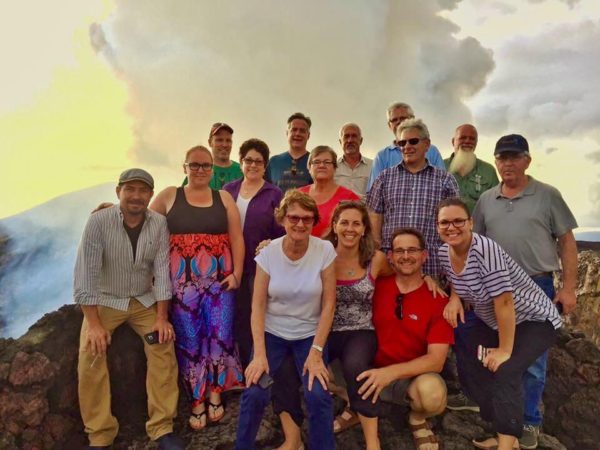
Water Ambassadors Team
A few years ago, my husband, brother and I traveled to Nicaragua together on a mission trip (along with a dozen volunteers) to help repair wells in rural communities. But I still stumble when people ask me if we were successful. As I struggle to give an easily understood, quick and polite answer, I’m filled with a swirling of hard-to-define emotions.
Our adventure in Nicaragua began the day before a theatrical sham of a national election, led by a dictator who’s campaign promises were rooted in violence and oppression and death. After landing and clearing customs, we were shepherded onto a bus – our luggage tied to the roof while we packed in together in the sweltering heat. The conversations on the bus mirrored the unfamiliar cadence of the landscape we meandered past. Our lives back home, our hopes and fears and expectations for this trip all tumbling together through each bumpy mile.
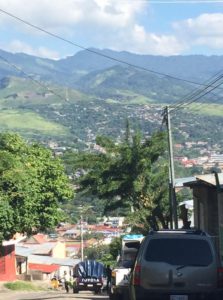 The landscape had it’s own stories to tell – poverty, desperation, maybe hope and something that oddly resembled beauty too. Like a child’s kaleidoscope, the scene changed with each blink. Telephone lines crisscrossed overhead while chickens ran unchecked from yard to yard, along with barefoot children, their clothes as dirty and colorful as the clapboard houses they darted between. Beat-up, old trucks passing us, people hanging off the front, the back, the roof. Whizzing past fields of coffee beans drying in the sun between valleys of lush, impossibly green foliage, ripe yellow bananas hanging from crumbling storefronts.
The landscape had it’s own stories to tell – poverty, desperation, maybe hope and something that oddly resembled beauty too. Like a child’s kaleidoscope, the scene changed with each blink. Telephone lines crisscrossed overhead while chickens ran unchecked from yard to yard, along with barefoot children, their clothes as dirty and colorful as the clapboard houses they darted between. Beat-up, old trucks passing us, people hanging off the front, the back, the roof. Whizzing past fields of coffee beans drying in the sun between valleys of lush, impossibly green foliage, ripe yellow bananas hanging from crumbling storefronts.
And then a stop between towns where soldiers ordered us off the bus, their hands casually caressing their machine guns. The nervous quiet, the averted gazes, the sound of one of our group throwing up near a tree, goats and chickens squawking and bleating and scattering nearby. And then marching back on the bus while we waited for money to be offered and accepted and our bus to be granted freedom to continue. Gratitude, our new traveling companion.
Arriving in Matagalpa and our home for the next 7 days
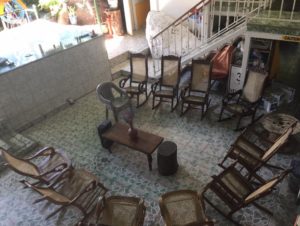
Matagalpa team house meeting area
When we reached our team house, open arms and laughter and a sweet wafting of unfamiliar spices and herbs beckoned us in. The women were assigned a room filled with bunkbeds, the men directed to different rooms with more bunkbeds. No comingling here, thank you very much. Behind the house, a craggy set of stone steps led to a magical, walled garden, but off limits to us after dark. Turns out, even high walls festooned with barbed wire can’t be trusted to secure the safety of a home and it’s occupants at night. Families that own a car, park them in their living room next to the TV or kitchen table. Our evenings – every one of them – would be spent safely locked inside our team house.
The next morning, our mission work took us to a remote village in the mountains. Breathtaking mountain-scapes replaced greasy city grime as our bus traversed along the edges of cliffs, overlooking smaller peaks rolling into overgrown valleys. Gravel roads became rutted mud-grooves, narrowing with each mile. At one point, both sides of the road fell away, making us feel as though we were traveling across a bridge to another time. Hillsides marked by chaotic-shaped farm fields, falling-down shacks we assumed were homes, women hanging laundry between them while pigs and the odd cow trundled past. The beauty of nature’s bounty, punctuated with pockets of rural, impoverished dwellings, seen through the cracked and muddy windows of an old bus – two hours each way.
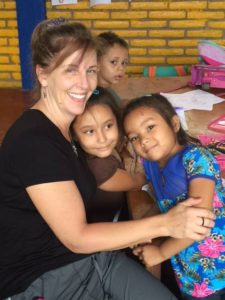 At our first village, the men set to work on the wells while the women walked to the schoolhouse to meet the moms and children. Stay together though, our leader cautioned. In a country where clean water is scarce, alcohol and drugs are abundant.
At our first village, the men set to work on the wells while the women walked to the schoolhouse to meet the moms and children. Stay together though, our leader cautioned. In a country where clean water is scarce, alcohol and drugs are abundant.
At the two-room schoolhouse, colorful posters covered every available inch of wall space. Alphabet and math facts and what to do if an adult touches your private places. School here is more about life skills, oftentimes how to survive their own families. Even so the kids danced and played around us, luring us into their games, language not even a hurdle to cross. The moms, shy and uneasy; the teachers, eager to connect but hesitant, nervous.
Though it had rained and our feet were muddy, the children were clean – hair parted, combed and greased into place, fresh shirts and shorts. A trip to the school outhouse later proved cleanliness is next to godliness when it comes to your home and your children, the outhouse notwithstanding. The door hung slack on rusty hinges and the inside looked as if it had never once been cleaned. It was just one of many times I’d give thanks for the invention of hand sanitizer.
At lunch – yes, we brought lunch for everyone – the kids and adults ate with extreme manners. Leftovers were handed to the teachers to distribute and as the village was without electricity, it would be heated up again that night over open fires. No refrigerators, lightbulbs or TV’s here, no warm baths for these remarkably clean, well-mannered children.
Our first evening back at the team house, we waited outside in the garden for our turn in the showers. No mud in the house, please. An electric-pump shower, pressurized and heated at the head with exposed wires, made reaching up to rinse my hair terrifying. As I washed my body and clothes at the same time, I vowed never take another shower for granted again. Which, of course, happened my second week home when I ceased to be amazed by the volume of water it took to flush a toilet.
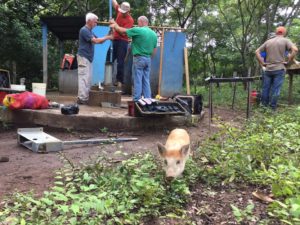 Our second day took us to a village closer to the city. The homes here were more solid, made from cinderblocks instead of sticks. Inside, we saw dirt floors and 20-year-old toasters and kettles and brand new big screen TVs being watched by overweight, angry-looking men. Young women who emanated weariness and undisguised disgust, sat in the kitchen or outside smoking and chatting with neighbors. Running between them, skinny, skittish children who gave a wide berth to adults. A pall hung over this village that was different from the last. While proximity to the city offered more modern comforts, it also afforded easier access to distractions that tore families apart.
Our second day took us to a village closer to the city. The homes here were more solid, made from cinderblocks instead of sticks. Inside, we saw dirt floors and 20-year-old toasters and kettles and brand new big screen TVs being watched by overweight, angry-looking men. Young women who emanated weariness and undisguised disgust, sat in the kitchen or outside smoking and chatting with neighbors. Running between them, skinny, skittish children who gave a wide berth to adults. A pall hung over this village that was different from the last. While proximity to the city offered more modern comforts, it also afforded easier access to distractions that tore families apart.
And yet happiness lived here too. The boys jostled each other to be part of the fixing of their village well, the women and girls keen to help as well, shooing the cows out of the way to make room for us. Our group took to the task at hand, clearing the well of debris and cow poop, unloading our tools and assessing the damage of the current well. After retrieving the broken pipes, along with copious amounts of foul smelling sludge, we took to assembling longer pipes that would pull water from below the surface scum, hopefully bringing “cleaner” water to the village. And when the work was completed, the joy and laughter and clear water spouting out of the well. The shared lunch, again, reason for celebration and prayer.
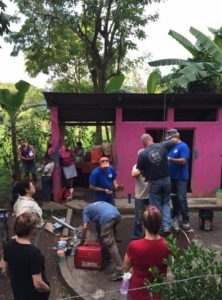 After the work was done, we visited a make-shift clinic for mothers and babies. I wish I could paint the picture of painfully young women, wafer-thin yet swollen with babies waiting to be born as they lined up at the entrance. Or explain the bareness of the clinic rooms, devoid of tools and medicine we take for granted, the nurses who took temperatures and listened to complaints but could do little more than soothe a damp brow or rub a shoulder in sympathy. I want to tell you I’ll never take my own medical care for granted again but, of course, that’s not true. In Canada, free and clear access to health care is a right, not a privilege…
After the work was done, we visited a make-shift clinic for mothers and babies. I wish I could paint the picture of painfully young women, wafer-thin yet swollen with babies waiting to be born as they lined up at the entrance. Or explain the bareness of the clinic rooms, devoid of tools and medicine we take for granted, the nurses who took temperatures and listened to complaints but could do little more than soothe a damp brow or rub a shoulder in sympathy. I want to tell you I’ll never take my own medical care for granted again but, of course, that’s not true. In Canada, free and clear access to health care is a right, not a privilege…
Our last day of repairing wells took us to the outskirts of Matagalpa, minutes from the rush of the city center. Again, the men began unloading the tools and supplies to build the wells while the women loaded up kits to visit the school. There was no suggestion to stay together here – we were escorted by two men from our group. A trip to the toilet also required a male escort – non-negotiable.
Even the school was different, more abundant with supplies and in a building that housed multiple classrooms, a teacher in each one. Some of the teachers spoke English and all were eager to connect, understanding that we had gifts to give – and each wanted to be the chosen teacher. The children too were different, even the young ones emanating slick street savviness. Stickers in my back pocket were stolen in the first hour, supplies in our bags quickly and quietly removed, the teachers and the children in direct competition for who would win more during our short time together.
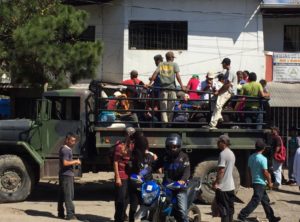 On our drive home from the village, we were followed by a group of men in a van. At a stoplight, one jumped out and tried to pry free some of our tools from the back of our bus. And as we drove through the city, stoned children staggered along sidewalks. Sniffing glue is the drug of choice here because it can be used repeatedly and by more than one person at the same time. And it’s addictive, making it lucrative business for dealers who target ten year-olds, adept pick-pocketers who can pay cash for goods received.
On our drive home from the village, we were followed by a group of men in a van. At a stoplight, one jumped out and tried to pry free some of our tools from the back of our bus. And as we drove through the city, stoned children staggered along sidewalks. Sniffing glue is the drug of choice here because it can be used repeatedly and by more than one person at the same time. And it’s addictive, making it lucrative business for dealers who target ten year-olds, adept pick-pocketers who can pay cash for goods received.
Our mission trip to repair wells in Nicaragua was never just about the water…
If it wasn’t about finding clean, safe water, what was it about Julia, you ask? And this is where I stumble when answering people about the “success” of our mission. The answer is tricky and longer than a simple yes or no.
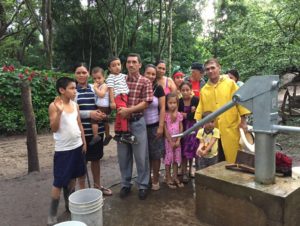 Our trip was about meeting the families, hearing their stories, shaking their hands, playing games with their children. It was about our learning and understanding that while they live their short, often hard lives in an underdeveloped nation that does nothing to protect their health or well-being, they have something many of us have lost here in North America. Faith and hope and perhaps community. While we may have one or a few of these things, few of us have all of them in abundance. Scrolling through our phones, watching Netflix, alone in our digital worlds, so many of us miss the joy of togetherness. Very few of us live in multi-generational homes and the learnings and love from our grandparents come in short visits, not through a life lived sunrise to sunset together.
Our trip was about meeting the families, hearing their stories, shaking their hands, playing games with their children. It was about our learning and understanding that while they live their short, often hard lives in an underdeveloped nation that does nothing to protect their health or well-being, they have something many of us have lost here in North America. Faith and hope and perhaps community. While we may have one or a few of these things, few of us have all of them in abundance. Scrolling through our phones, watching Netflix, alone in our digital worlds, so many of us miss the joy of togetherness. Very few of us live in multi-generational homes and the learnings and love from our grandparents come in short visits, not through a life lived sunrise to sunset together.
Don’t get me wrong – there’s nothing glamorous about poverty. Many of the children we met won’t live past their youth. And if they do, an abscessed tooth could destroy their lives as quickly as the equally real possibility of rape or assault or drug abuse. If they’re lucky, their lives will be filled with hard work, morning to night, seven days a week, sheltering and protecting their loved ones from the ravages of poverty. The dirty water they’ll drink will lead to unexplainable ulcers and sickness and, most likely, an earlier death than you and I can expect.
While fixing three wells helps, it doesn’t help enough.
Which brings me back to the question about our trip. Were we successful? Did we fix the wells we set out to fix? I usually manage to sputter something out, some answer that hints the trip was about so much more than water. But I often fall short of explaining, losing the plot before I’ve even begin the story. You listen to my answer and nod, saying that going on a mission trip is noble work. I can hear dismissal in your voice, an eagerness to get on with our conversation.
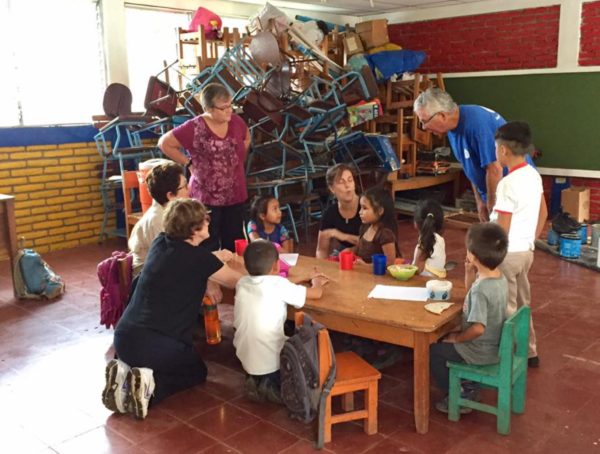 But the harsh truth is that if we feel we need to give back, it means we’ve taken too much – and there’s nothing noble in that.
But the harsh truth is that if we feel we need to give back, it means we’ve taken too much – and there’s nothing noble in that.
Building wells is important, much-needed work but when we give time, we give the part of our selves that we can’t buy or package up and ship. Time, our most precious, non-renewable resource. And within that beautiful, priceless gift of time, we find the sometimes hidden treasures of love and compassion and understanding. We may have known they were there but maybe we didn’t know how they’d look when given like this, in this kind of place, to these kinds of people.
Had I known that my time and my love would be the most important things I’d leave behind in Nicaragua, I would have gone sooner – and I’ll always want to go back, do it again and again.
So, how was my trip? Was it successful? Yes, yes it was… but it wasn’t enough. Not even close.


Latest comments